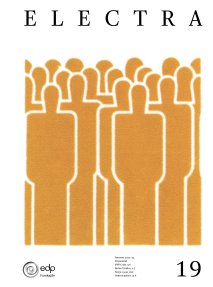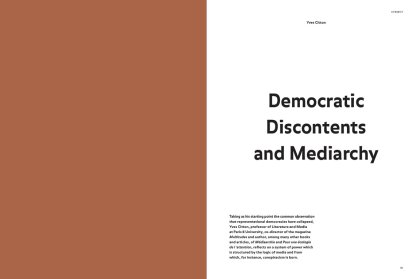For years and decades now, in large parts of the Western (dominantly white) world, electoral processes have been the subject of lamentations about the increasing rates of abstention (especially among ‘young people’), the prevalence of so-called ‘populist’ parties, and the lack of substance in electoral campaigns that elude the most important and damning ecological and social issues. The assessment seems to have gone a long way beyond discontent: representational democracies are shipwrecked.
Taking as his starting point the common observation that representational democracies have collapsed, Yves Citton, professor of Literature and Media at Paris 8 University, co-director of the magazine Multitudes and author, among many other books and articles, of Médiaarchie and Pour une écologie de l 'attention, reflects on a system of power which is structured by the logic of media and from which, for instance, conspiracism is born.

WHITE DEMOCRACIES' LAMENTS
‘Young people’ do not vote: are they demobilised, distracted, stupid? Perhaps, more simply, they know better: they are no longer willing to play the fool. The hypocritical speeches and histrionic postures of most of the candidates are less and less able to hide the fundamental lie of politics as usual – a lie that is constitutive of our ‘political debates’ because it is at the basis of our economic calculations. Neoliberal or Keynesian, everyone counts on higher growth and boosted consumption. In the US and the UK, in France and Italy, even if minoritarian left-wing and green parties do occasionally access to governmental power, the winning electoral cocktail has to promise more purchasing power, more work, more wealth, more trickle-down, better services, with less taxes, less regulations, less crime, less foreigners. You do not need to be an expert in differential equations to feel how desperate (and hopeless) are the ‘solutions’ advocated by mainstream (mostly white) politicians to face/dodge the most pressing issues of our time (revolting inequalities, the 6th great extinction, climate change, the end of cheap nature).
The shipwreck of representational democracies is precisely located in the dramatic mismatch between, on one hand, the lies that politics-as-usual must promise to win elections and, on the other, the truths that nobody dares to utter (for they would exclude the utterer from any chance to be elected). This mismatch is not so much a matter of agenda, however, as a matter of infrastructure. What Benjamin Bratton derides as ‘the avatar model of political representation’ is structured around a symbolical process, which he summarises as such:
First, name an evil that does bad things to people, and then imagine the inverse of the bad thing which now becomes the good thing. Identify with the good. Next, find human avatars of this good thing: people who personify this identification and its proper articulation. […] Collectively invest a plurality of avatars with official agency to articulate their various personifications within a sovereign forum in which potential policies are represented. There, the gathering of avatars will contest various symbolizations and then codify consensus declarations into decrees. These policies are text-based model simulations of future transformations that seek to ensure that the good is realized. Financial means are allocated to actualize the decree simulation in the real world. […] If the process does not work, and there is not less of the bad thing, then return to the phase where avatars are honed and filtered for the purity of their personification with the good. Repeat1.
"The fundamental lie upon which our discontented democracies are built consists in assuming that free-willed individuals freely choose the political agenda to which they will subscribe by electing this human avatar rather than another one."

This model of political representation – locally developed, but colonially promoted on a global scale – is clearly running out of steam. Even white folks can no longer believe in the white (and often supremacist) regime they advocate (and sometimes militarily enforce) for all human populations to admire under the label of (Western) ‘democracy’. It would be foolish to simply rejoice in view of this downfall: while the European colonial arrogance deserves to be squashed, the merits of the regime of (relative and unequal) liberties developed in the Western world do keep a wide and understandable appeal, when considered from regions subjected to the pains of (unsophisticated) corruption, military oppression and autocracy. But as representational democracy generates a mix of appeal and discontent, it requires a double movement of reframing and critique.
The reframing can be inspired by the alternative history of democracy written within the Black Radical Tradition. In The Terms of Order2, Cedric J. Robinson sketched a non-white-centred approach to political power which deconstructs the notions of order, hierarchy, leadership, power, law, formalisation, accounting, individualism – all presupposed by the dominant concept of democracy. In The Undercommons and in All Incomplete3, Stefano Harney and Fred Moten pursue Robinson’s pioneering work by debunking the nefarious prevalence of a vocabulary based on concepts like interests, improvement, policy, politics, governance or logistics. This alternative tradition, firmly anchored in the claims of blackness as well as in the criticism of whiteness, provides us all with a different frame within which to consider what can be appealing or repulsive, necessary or dispensable in the way human beings share their incompleteness in their plural collective practices of inhabiting a territory.
[...]





Share article